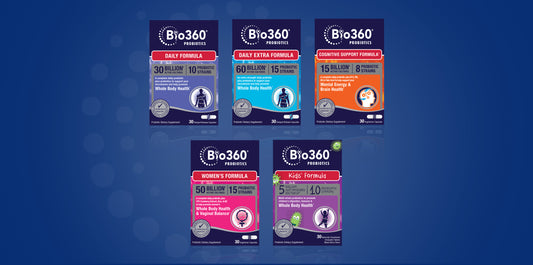
Probiotics and the Immune System
 by Dr. Émilie Desfossés-Foucault, Scientific Advisor
by Dr. Émilie Desfossés-Foucault, Scientific Advisor
Dr. Émilie Desfossés-Foucault is a microbiologist with a PhD in Food Science. She has postdoctoral training in the probiotic field and has extensive knowledge in food microbiology, probiotics, molecular biology, fermentation, and is also trained as a cheesemaker.
Probiotics and the Immune System
A healthy gut microbiome houses a gold mine of bacteria. Despite its unfavorable reputation, most of this bacteria is beneficial. In fact, the right balance of healthy gut bacteria happens to be essential to our body's immune response. And because our gut makes up 70% of our immune system, gut health is vital to overall good health.¹
So then, how can we help protect, build, and maintain a healthy microbiome of bacteria in the gut? Probiotics are one way. They are live bacteria and yeasts typically sourced from dairy foods or dietary supplements. These live microorganisms can help augment the gut with the same beneficial bacteria normally found in the intestinal tract. How exactly? Let's first take a deep dive into what the immune system does.
What is the Immune System?
The immune system is made up of the skin, mucous membrane, gut, thymus, bone marrow, lymphatic system, white blood cells, and microbiome. It's a mass network of different cells, tissues and organs, as opposed to one single entity. Therefore, the benefits of a strong immune system are far-reaching.²
The immune system has been at the forefront of conversation, as of late. And it makes sense why. A strong immune system: (1) can be the first line of defense against foreign substances; (2) identify and neutralize harmful threats; and (3) provide back-up when your body and cells are going through changes.³
Simply put, the immune system is a superhero when it comes to stopping villains trying to invade the body.
On the other hand, a compromised immune system opens us up to infections, inflammation, allergies, autoimmune conditions, and more.
How does the Immune System work?
A strong immune system ensures the body is able to keep performing at its best. Skin can help stop bad bacteria from entering the bloodstream. Mucous membranes trap pathogens before they enter the body. The thymus produces T-cells and bone marrow produces both T-cells and B-cells. T-cells and B-cells are white blood cells that help fight pathogens. The lymph system carries these white blood cells, along with nutrients and waste materials, in and out of the bloodstream.
But it doesn't end there. Gut health plays a lead role in immune performance (remember, the gut makes up 70% of our immune system). Research has identified that a large, healthy colony of beneficial bacteria in our gut could:²
-
protect the epithelial cells and mucus lining of the gut wall (If that line of defense diminishes, the gut microbiome leaves itself open to a "leaky gut" condition, associated with immune health challenges, chronic fatigue, food intolerance, allergies and low mood);
-
combat bad bacteria by taking up all the space and food available inside the gut;
-
provide an acidic environment in the gut that is hostile to bad unfriendly bacteria; and
-
support a healthy inflammation response.
Tips for Boosting Your Immune System
A bacteria-rich gut microbiome is key to a balanced immune response. Probiotic intake, a healthy diet, nutrient supplements, and clean lifestyle habits can all help contribute.
-
Healthy Foods
Research indicates that changes in nutrition can boost your immune system response. A high-fat diet, high-sugar diet, excessive alcohol, excessive exercise, smoking, long-term stress, antibiotics, and insomnia can lead to weakened immunity. Instead, include colorful, fresh fruits and vegetables into your diet. Ingredients including garlic, turmeric, and ginger, along with live yogurt, sauerkraut, and other fermented foods, also help increase immunity. -
Lifestyle Choices
Lifestyle contributes to immune response, as well. A consistent sleep schedule and regular exercise program can boost immunity. Incorporate yoga, pilates, or meditation to decrease stress. If you smoke, it may be time to quit. -
Nutrients
Supplement nutrition with Vitamin A, Vitamin C, Vitamin D, Copper, Zinc, Folic Acid, and Vitamin B12. -
Probiotics
Probiotics can aid in adding beneficial bacteria depleted by a high-sugar diet, processed foods, artificial sweeteners, stress, digestive issues, the pill, or hormone replacement therapy. Scientists studying the microbiome have found that specific bacteria can be used to support specific functions.
Which Probiotics Can Help Boost the Immune System?
Research has indicated that three strains of bacteria specifically can help support the maintenance of a healthy immune system and increase antioxidant activity: Lactobacillus acidophilus; Lactobacillus plantarum and Bifidobacteria animalis subsp. lactis.
Lactobacillus acidophilus (L. acidophilus) produces lactic acid to help support the health of all our good bacteria.²
Lactobacillus plantarum (L. plantarum) has been shown to play a key role in supporting the health and integrity of the gut wall.²
Bifidobacteria animalis subsp. lactis and Lactobacillus plantarum help with the absorption and production of vitamin B12 and folic acid, both of which are important to support immune health.²
Enjoying a Healthier Lifestyle with a Strong Immune System
Studies indicate that the right balance of healthy gut bacteria can boost our body's immune response. One such study carried out on the immune supportive benefits of L. plantarum and L. acidophilus revealed that these probiotic strains enhanced the intestinal immune systems by increasing the level of monocytes, neutrophils, and antibodies.³ This means that supplementing with these bacteria may assist in preparing the body and stay ready to defend.
In another study, L. plantarum was used on people suffering with fatigue. Over a 30-day period, those people taking a supplement including L. plantarum reported a 60% improvement in symptoms and experienced a 16% improvement in natural killer cell activity.²
1. Vighi, G. et. al Allergy and the gastrointestinal system. Clinical & Experimental Immunology. 2008;153:3–6.
2. (2019, February). Immune Health, Advice on Supporting and Maintaining a Healthy Immune System. Jenny Logan.
3. Institute for Quality and Efficiency in Health Care (IQWiG). (2020). How does the immune system work? Retrieved from https://www.ncbi.nlm.nih.gov/books/NBK279364/



